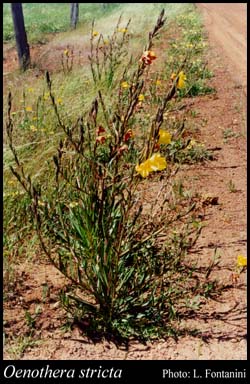- Reference
- Enum. Hort. Berol. Alt. 1:377 (1821)
- Conservation Code
- Not threatened
- Naturalised Status
- Alien to Western Australia
- Name Status
- Current
Erect annual or biennial, herb, 0.2-1 m high. Fl. yellow, Mar to Jul or Sep to Nov. Sandy soils. Roadsides, sand dunes.

Distribution
- IBRA Regions
- Avon Wheatbelt, Esperance Plains, Geraldton Sandplains, Jarrah Forest, Mallee, Swan Coastal Plain, Warren.
- IBRA Subregions
- Fitzgerald, Katanning, Lesueur Sandplain, Northern Jarrah Forest, Perth, Recherche, Southern Jarrah Forest, Warren, Western Mallee.
- Local Government Areas (LGAs)
- Augusta Margaret River, Beverley, Brookton, Busselton, Canning, Cockburn, Collie, Cottesloe, Cranbrook, Dandaragan, Esperance, Gosnells, Irwin, Jerramungup, Katanning, Kent, Kojonup, Kwinana, Lake Grace, Mandurah, Manjimup, Melville, Plantagenet, Ravensthorpe, Rockingham, Serpentine-Jarrahdale, Stirling, Victoria Plains, Wanneroo, Waroona.
Management Notes (for the Swan NRM Region)
Alternative Names. Fragrant Evening-primrose, Sweet Sundrop.
General Biology. Growth form. Herb. Life form. Perennial. Reproduction. Seed. Dispersal. Wind, soil movement.
Notes. Widely naturalised. Flowers are generally only fully open in low light conditions (early morning, evening and on cloudy days). Germination rates are higher under particular light conditions, that occur when some form of disturbance clears overlying vegetation or buried seed is unearthed. Produces numerous fine seed. Adapted to coastal climates and conditions.
Additional information. Origin. Southern Chile and Argentina. Similar exotic species. Oenothera drummondii.
Suggested method of management and control. Control in seedling stage, as older plants are resistant to herbicide. Relatively tolerant of glyphosate. Hand remove small populations, ensuring removal of entire root stystem. Spot spray chlorsulfuron 0.4 g/10 L + spray oil. Read the manufacturers' labels and material safety data sheets before using herbicides. For further information consult the Australian Pesticides and Veterinary Medicines Authority to determine the status of permits for your situation or state.
Management Calendar
| Calendar Type | Jan | Feb | Mar | Apr | May | Jun | Jul | Aug | Sep | Oct | Nov | Dec | Comments |
|---|---|---|---|---|---|---|---|---|---|---|---|---|---|
| Active Growth | U | U | U | ||||||||||
| Germination | U | U | U | U | |||||||||
| Flowering | Y | Y | Y | Y | Y | Y | Y | Y | Y | Y | Y | O | Can flower throughout the year |
| Fruiting | U | U | U | U | U | U | U | U | |||||
| Manual Removal | O | O | O | O | O | O | O | O | O | O | O | O | |
| Herbicide Treatment | U | U | U | U |
Legend: Y = Yes, regularly, O = Occasionally, U = Uncertain, referred by others but not confirmed.
References
- Bell, D.T. (1993) The effects of light quality on germination of eight species from sandy habitats in Western Australia. Australian Journal of Botany, 41 (3): 321-326.
- Bromilow, C. (1995) Problem plants in South Africa. Briza Publications, Arcadia, South Africa.
- Brown, K. & Brooks, K. (2002) Bushland Weeds: A Practical Guide to their Management. Environmental Weeds Action Network, Greenwood.
- Burnside, O.G., Wilson, R.G., Sanford Weisberg, S. & Hubbard, K.G. (1996) Seed longevity of 41 weed species buried 17 years in Eastern and Western Nebraska. Weed Science, 44: 74-86.
- Hussey, B.M.J., Keighery, G.J., Dodd, J., Lloyd, S.G. & Cousens, R.D. (2007) Western Weeds. A guide to the weeds of Western Australia. 2nd Edition. The Plant Protection Society of Western Australia, Victoria Park.
- Mihulka, S. & Pyšek, P. (2001) Invasion history of Oenothera congeners in Europe: a comparative study of spreading rates in the last 200 years. Journal of Biogeography, 28 (5): 597-609.
- Moore, C.B. & Moore, J.H. (2002) Herbiguide, the pesticide expert on a disk. Herbiguide, PO Box 44 Albany, Western Australia, 6330.
- Moore, J.H. & Wheeler, J. (2008) Southern weeds and their control. DAFWA Bulletin 4744.
- Rippey, E. & Rowland, B. (2004) Coastal plants: Perth and the South West Region. University of Western Australia Press, Crawley.
- Swarbrick, J.T. & Skarratt, D.B. (1994) The bushweed 2 database of environmental weeds in Australia. The University of Queensland, Gatton College.
- USDA, ARS, National Genetic Resources Program (2009) Germplasm Resources Information Network - (GRIN). National Germplasm Resources Laboratory, Beltsville, Maryland. URL: https://npgsweb.ars-grin.gov/gringlobal/taxon/taxonomysimple.aspx - Accessed October 2009.